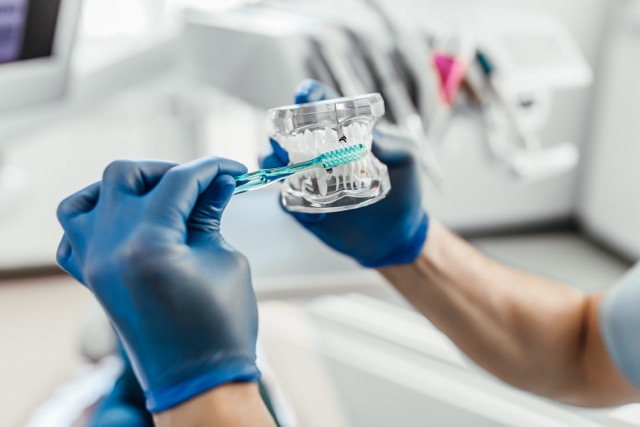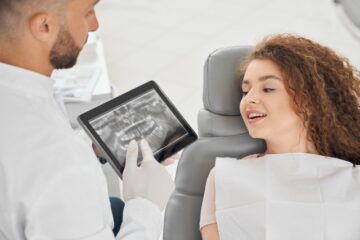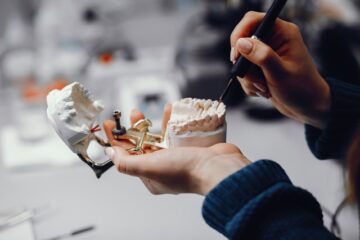What to Eat After Dental Implant Surgery: Nourishment and Healing Guide

Contents

The installation of a dental implant is a surgical procedure. It requires not only preparation for the operation, coordinated and professional work of the dental surgeon, but also postoperative rehabilitation. This includes taking medications and following a special diet during the first weeks after the procedure.
Dental Implant diet timeline
Nutritional guidelines after dental implant surgery can be divided into four key periods:
- First hours after the surgery: During this period, it is recommended to drink still water systematically. Water improves overall well-being, accelerates metabolism, and contributes to postoperative recovery.
- First 48 hours after the surgery: It is advisable to consume liquid or very soft food, preferably on one side to avoid food getting into the implant area.
- First week after the surgery: The recommended diet includes pureed foods and puddings.
- Second week after the surgery: Gradually introduce dishes such as fish, meat, and omelets into the menu, but still in a soft form.
More about specific dietary products and the diet during the rehabilitation period after implantation will be discussed in the following sections. But before delving into this topic, let’s talk about the restrictions that should be observed in the first weeks after the procedure.
Immediate dietary restrictions right after dental implant surgery
- Say no to hot food. Even if you consume tea, puree, or other soft food, make sure it is at room temperature. Hot food can injure the tissues of the oral cavity.
- Say no to harmful habits. Alcohol, smoking (both regular and electronic cigarettes) harm not only overall health but also create a bacterial environment in the oral cavity. This can lead to inflammation and implant rejection.
- Refrain from drinking through a straw, bottle neck, or thermos spout when you need to “suck” while drinking. This movement of the mouth muscles can lead to implant displacement, which is very dangerous.
- Say no to any solid food. Nuts, snacks, chips, sandwiches, meat, hard chocolate, toffees, and any other solid food are off-limits for you for a few weeks. Endure a bit without such food, and you will be pleased with the positive results of the implantation.
List of soft foods to eat after the initial recovery phase of dental implants
Soft and liquid food is a must-have after implant placement. It’s important to eliminate any chewing load to minimize both pain and create the most comfortable conditions for implant integration. Here are some options for soft foods to eat after dental implants.
- What to eat after dental implant surgery (first hour)
The first thing you can and should consume after the surgery is water. It will help your body recover faster, provide a boost of freshness and energy, and stimulate metabolism and cellular regeneration. Drink an adequate amount of water throughout the rehabilitation period, saturate your body with enough water, and you will feel better and more energetic with each passing day.
- Your diet in the first 48 hours after the procedure
Smoothies
In the first two days after implant placement, embrace your inner hipster. Prepare and buy various smoothies, both fruit and vegetable. The key is to ensure they don’t contain solid ingredients like chia seeds, pumpkin seeds, etc. Even though they might be partially blended, remnants of such foods could stay in your mouth.
Puree
Mashed potatoes, broccoli soup puree, chickpea soup puree, fruit puree for dessert – you have plenty of options for nutritious pureed food that you can eat in the first days after the procedure. Choose flavors you like and create a delicious menu for yourself for a week or even the entire rehabilitation period. Ensure your diet includes both vegetables and fruits, as well as protein-rich foods.
Dairy Products
If you’re a fan of dairy products, this is your time. Without guilt, you can treat yourself to yogurts, milkshakes, and soft cheese. These are excellent sources of protein and probiotics that will take care of your health. If you are lactose intolerant, opt for lactose-free products.
- What to eat after dental implants – recommendations for the first week after the procedure
In addition to all the mentioned foods allowed in the first days after the operation, you can gradually add other soft dishes.
Omelet
A fluffy and juicy omelet can be an excellent addition to dairy products, puree, and smoothies. Moreover, while you are in rehabilitation, you can have omelets not only for breakfast but at any other time. It’s delicious, filling, healthy, and, most importantly, suitable for your diet.
Porridge
Liquid porridge with a homogeneous texture is an excellent source of carbohydrates and energy. Add corn or oatmeal porridge to your menu at least once a day for a well-rounded diet.
- In the second week, expand your diet
Soft-boiled Vegetables
Carrots, broccoli, and other favorite vegetables can be eaten from the second week after implant placement. However, there is one “but” – vegetables should be boiled, as you should exert minimal effort to chew them during meals.
Fresh Soft Fruits
Bananas, strawberries, soft kiwi, ripe peaches – try adding soft fruits to your menu that require minimal chewing.
Meat and Fish Pâtés
If you can’t live without meat or fish, it’s time to add such products to your diet, albeit in a soft form. Pâtés will balance your menu and finally give you a feeling of fullness.
Soft Bread
But by no means crispy toasts. If you love baked goods, eat soft bread without a crust. By the way, it goes well with meat and fish pâtés.
Let’s note that for the second week, the list of foods allowed after dental implant placement is not limited to these products. It’s important that they are soft and not hot. For example, this could include rice, pasta, various puddings, and airy cheesecakes.
Foods to avoid after dental implants
Here’s a brief list of foods and dishes that should be avoided in the first weeks after dental implant surgery:
- Hard food that requires chewing, ranging from nuts to steaks or fast food.
- Citrus fruits such as oranges, lemons, and tomatoes – acidic fruits and vegetables irritate the mucous membrane and can damage it. This can cause not only discomfort in the area of the implant but also disrupt tissue regeneration. Consequently, pain and healing of the oral wound may take longer.
- Spicy food, spices, and sauces, even in puree form. This irritates the mucous membrane.
- Food and drinks that are too cold or too hot. It’s better to postpone hot coffee and ice cream or wait until their temperature approaches room temperature before consuming.
Eating After Dental Implant: Transitioning to Regular Diet
The main indicator that you can gradually transition to a normal eating routine is your comfort level and the absence of pain in the oral cavity. Once you feel that you are recovering, and the pain in the gum and implant area has disappeared, you can gradually return to your regular way of eating.
- Start by introducing soft foods that are easy to chew into your diet, such as bread with crust or baked fish.
- Afterward, try reintroducing chunkier foods, pancakes, sandwiches, etc. If you experience no discomfort during chewing – that’s great.
- Over time, you will be able to reintroduce all your favorite crunchy foods into your life. However, in the first few months, it’s recommended to chew on the side opposite to the implant until it fully heals.
Importance of a Balanced Diet for Efficient Healing After Dental Implants
In one of the sections above, we introduced you to a list of foods that you can eat after getting an implant. However, a crucial aspect when following a “soft diet” after the surgery is maintaining a balanced nutrition.
During this period, it’s more important than ever for your body to receive proteins, fats, and carbohydrates, as well as essential minerals and vitamins. This is directly related to your health and the pace of rehabilitation.
Tips for Maintaining Oral Hygiene After Dental Implant Surgery
Regarding recommendations for oral care, here’s a simple guide:
- Clean your teeth using your regular method, but avoid the area where the implant is placed, no earlier than a day after the procedure.
- Rinse your mouth with saline water. Ideally, do this in the morning, evening, and after each meal.
In conclusion, a soft diet is no less important than the Dental Implant Surgery itself. By following it, you not only minimize discomfort but also create optimal conditions for the implant to heal. Follow your dentist’s recommendations, and may your new smile be flawless!
Diet after dental implants: the Most Common Questions
How soon can you eat after dental implants?
Yes, you can eat soft food as soon as one to two hours after the dental implant surgery. However, it’s important to consume soft food that doesn’t directly impact the area where the implant is placed. Ideally, this could be in the form of a smoothie or pureed soup that you can either spoon-feed or drink from a glass.
How long to eat soft foods after dental implant?
The first two weeks after implantation, dentists strongly recommend consuming exclusively soft and liquid food. It’s important not to put excessive chewing stress on the oral cavity to allow the gum area and mucous membrane to recover well after the surgical intervention. After 14 days post-procedure, you can gradually introduce solid food, fresh vegetables, and fruits.
What to drink after dental implant surgery?
If you’re feeling thirsty after the dental implant surgery, the best way to quench it is with still (non-carbonated) water. Avoid sparkling water or sweetened beverages in the first few hours. It’s crucial to minimize irritation to the oral cavity during this period, and carbonation or sugary drinks are not the best companions. Carbonation can irritate the mucous membrane, and sugary drinks can contribute to the formation of bacterial plaque.
Additional ResourcesDental Implants: What You Should Know – FDA, U.S. Food and Drug Administration













